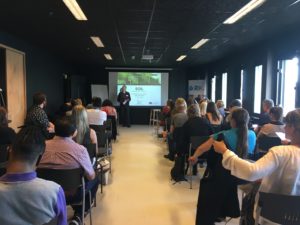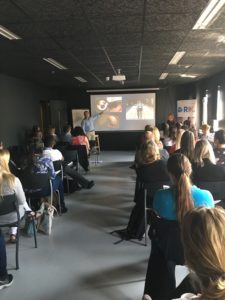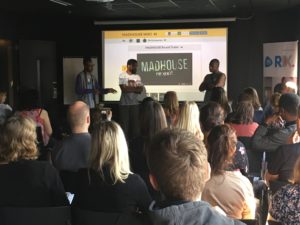
Last Friday 20 April 2018, Rix Research & Media held a conference for the Social Inclusion of Learners (SOIL) project. The aim of the conference was to inspire and inform educators about new and innovative methods of inclusion in schools. The information was facilitated by a range of guest speakers from around the world who shared with delegates their methods and expertise. The conference was attended by educators from the UK and Europe.
Throughout the day, information on different methods of inclusion were presented. John Galloway from the London Borough of Tower Hamlets presented on the history and advancement of technology, showing some advances that assist people with disabilities. John informed the group of amazing technology that is able to aid people with sight and hearing. He also crucially highlighted that there are barriers to people accessing the assistive technology they need. Luckily, assistive technology such as devices with environment control such as Amazon’s Alexa are being integrated in mainstream technologies making it much more affordable.
 Presenters from the Austrian organisation atempo demonstrated mainstream applications that show great possibility to move towards inclusion in schools. One application that was particularly exciting was Plickers. It was immediately clear that Plickers engaged and motivated the delegates and could be used in a number of ways to tailor the classroom to the needs of the student.
Presenters from the Austrian organisation atempo demonstrated mainstream applications that show great possibility to move towards inclusion in schools. One application that was particularly exciting was Plickers. It was immediately clear that Plickers engaged and motivated the delegates and could be used in a number of ways to tailor the classroom to the needs of the student.
Margret Rasfeld from Germany based ‘School on the Move’ gave an eye-opening presentation about her organisation and their ground-breaking educational methods. The presentation explained how the school is upending the traditional concept of a classroom environment and the roles of educator and student, and empowers students to learn in an effective way for themselves. The methods presented by Rasfeld, allow students to take control of and direct their own education through the use of ‘learning boxes’. Her presentation encouraged her fellow educators to consider the benefits of using these ‘new-age methods’.
Another group of presenters (Rufaro, Paul, Lee) from the Access All Areas theatre group presented their Madhouse Rix Wiki, explaining how the Wiki had facilitated and documented their research into life in a mental institution in the UK, and how it had also augmented their acting in a satirical play showing what life would have been like if they were stuck in a ‘MadHouse’ of the past.

Their Wiki presentation illustrated exactly the approach that Rix Inclusive Research champions – multimedia technology that supports people to organise their thoughts and ideas and enables people to speak for themselves and advocate for themselves. Prof. Andy Minnion, and Ajay Choksi explained Multimedia Advocacy and its importance to the group. In the Rix presentation, delegates learned about how selfies have become such a large part of today’s world and how those pictures can help you understand and define yourself, an idea Andy describes as ‘selfie advocacy’.
The conference was successful in bringing in people from across the world and teaching them about different methods and approaches to having inclusion in schools.
Story By Ramsey Hufford

